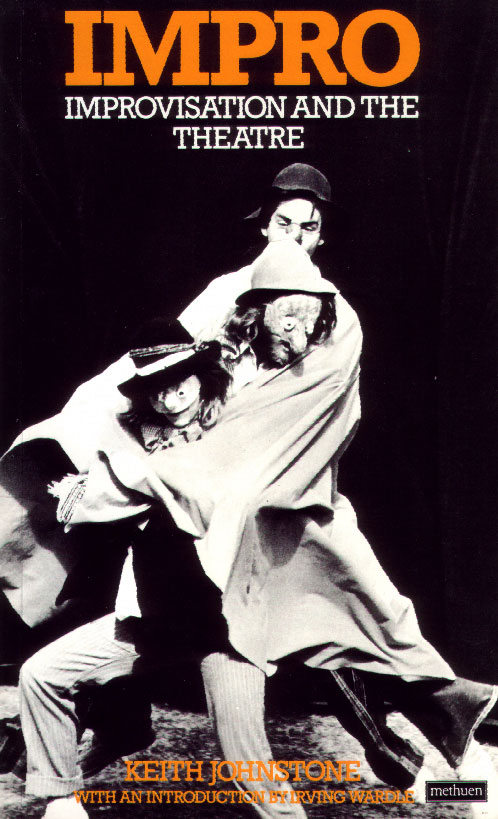Failing at the Beginning and the End
/International living treasure, Keith Johnstone.
If you haven't read his book Impro: Improvisation and the Theatre ...well, you're missing out on one of the best books ever written. But then maybe I'm biased. I'm not a freaking robot, automaton, empty shirt! Then again, how would I know if I was one?
 When I finally got Sgt. Rory Miller to read Johnstone, he wrote back to me, "Martial arts are to fighting as acting is to improvisation."
When I finally got Sgt. Rory Miller to read Johnstone, he wrote back to me, "Martial arts are to fighting as acting is to improvisation."
There is a little bit of new material in these videos, stuff that isn't in Impro. I only know that because I've read the book countless times. One thing that is new, is that he defines trance simply as the absence of a little voice in the back of our heads analyzing, strategizing, calculating and attempting to steer our actions.
Having had a bit of time on my trip to read some Buddhist texts with my wife, I realized that I reached enlightenment. My wife says that regardless of this achievement, I'm still responsible for washing the dishes. Unfortunately, being an unlicensed immortal, there has been no one around to give me a certificate of completion. Buddhists and Daoists alike, use various description to describe the same experience. One calls it a view, another calls it a base, and another calls it a pervasive awareness, complete emptiness, a limitless release of the spatial mind. The Zen tradition, Dzogchen (Tibetan Buddhism), Zuowang (Daoism), all refer to transcending duality via a non-conceptual method.
I hear it reported that some people have trouble getting non-conceptual methods to work, so they try other stuff. It is really out of all this other stuff that someone came up with the term 'enlightened,' because if you just do the non-conceptual thing, well...it doesn't lead to that kind of naming.
If I were to get up on a stage and start explicitly teaching non-conceptuality, I would use the stage itself as my metaphor. The experience is like an empty stage. You can put anything on it. It doesn't change the stage or make it go away. You can easily be so involved in what is on the stage that you forget there is a stage there.
So I would hazard that everything on the stage is a sort of trance. I haven't squared this with Keith Johnstone's explanation. But I'm working on it.
Something he says in the 6th video in this series is that movement experts as they age can get really grumpy and crotchety in general and tend to have a hard time improvising. This is because their bodies know what to do. That's a bit close to home.
I mean, I'm tapped into the flow and all, but the process of teaching what is right, what is correct movement-wise, is a double edged spear. It is imperative for us as teachers that we let go of knowing. It is imperative that we keep returning to 'beginner's body;' to uncoordinated, clumsy, wild and empty.
As a student, I have mostly held improvisation as the fruition of practice. I studied with Johnstone when I was 15 and the damage was permanent.
It is dreadfully important for teachers to create situations where they themselves fail. Otherwise we condition ourselves to believe we are correct. If we are conditioned to a belief, we will be insulated from reality. We have to keep creating new tests. And if we want to condition our students to be free fighters, then they also need to experience us, their teachers, failing miserably.  Did you know that if coffee makes you sleepy, it is diagnostic for ADHD?
Did you know that if coffee makes you sleepy, it is diagnostic for ADHD?
Probably not great business advice huh? Still, I'm going to get yinyang t-shirts printed that say 'Sometimes I'm a Loser,' and make a go of it. I heard that the Italians named weak coffee Americano, because they wanted to make fun of us weak Americans. Like taking on the insult Yankee, which meant one who masturbates a lot, I think we as teachers can try to find some actual humility. Like the stage, it's always there, it's always available...
There is an imperative for us to figure out how to put improvisation at the very beginning and keep it at the center of martial arts training at every level.
_________________
Johnstone says we are a culture that fears trance. Perhaps we could say, wherever modernity arises trance goes into hiding. When we talk about the art of improvisational movement we are talking about going into different types of trance. There are many, many way to do this, setting a rhythm, catching a feeling, imagining a scene.
Isn't it interesting that there is a parallel between Johnstone talking about the central challenge of knowing what the person we are on stage with wants, and the Taijiquan classics (Sunzi too) talking about knowing your adversary better than she knows herself?
Martial Arts forms and stances are really like scripts that we extemporize off of, we use them to spin off into chaos and then we fight our way back to them. In a pure improvisation we wouldn't know them, we might not even remember them.
This body forgetting is a great challenge. Are tension and remembering one and the same?

